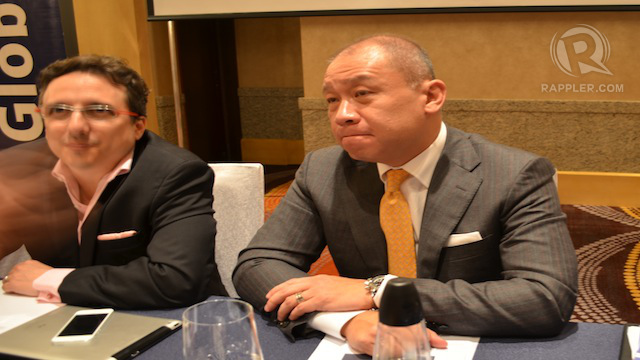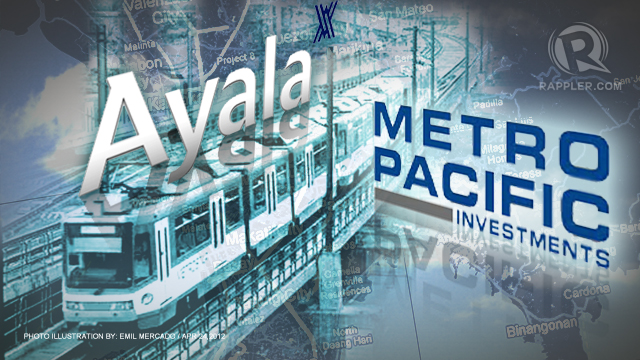SUMMARY
This is AI generated summarization, which may have errors. For context, always refer to the full article.

MANILA, Philippines – Telecommunications companies, such as Ayala-led Globe Telecom and Pangilinan-led Smart Communications, could provide services and assets to the new railway ticketing system that the government is bidding out, said Ernest Cu, CEO of Globe.
Speaking at a press briefing on Tuesday, April 16, Cu, whose company Globe is part of the AF Consortium that is bidding for the common ticketing system for Metro Manila’s 3 rail systems, said that telcos would provide support via distribution and infrastructure.
These are services the telecommunications are already offering to their mobile and broadband subscribers, said Cu, citing the case of G-Cash, a mobile-based electronic commerce service.
“If you can imagine the ticket tender being something like a G-Cash product, which is available in thousands of locations around the Philippines, it would alleviate the problem of lining up for the ticket booth,” he said.
“If we could now use a card on a NFC phone in the future it would automatically be deducted. The telcos coming together is unique opportunity to enhance distribution of this particular ticketing tender,” said Cu.
Near field communication or NFC system on a SIM card allows for wireless and paperless money transactions, ticketing, exchange or information and buying from vending machines.
Mobile apps
Through their network and current subscriber base, Cu also said the telcos can also offer mobile apps, which can inform passengers of train timings or how crowded the trains are.
“There are so many things that are logical to what our business is today and the ticketing system,” he said.
According to Cu, the likely outcome of the new ticketing system would be a hybrid.
“Not every phone is enabled with NFC today, so it is more likely that it will be a hybrid card option very similar to the Octopus cards you see in Hong Kong,” he said.

Ticketing system
The Contactless AFCS PPP Project aims to modernize and improve the overall passenger experience at the Light Rail Transit (LRT) and Metro Rail Transit (MRT) systems by introducing smart card-based technology initially for the 3 light rail systems, and eventually to other modes of mass transportation.
The new ticketing system aims to be similar to the Octopus smart card used in Hong Kong’s public transport systems and convenient stores replacing the current separate and incompatible ticketing systems currently used at the LRT Line 1, LRT Line 2 and MRT3.
This tap-and-go system will enhance fare collection efficiency by reducing leakage and fraud.

Smart-Globe partnership
The Ayala and Pangilinan groups are rivals in telco but allies in bidding for rail projects in Metro Manila.
Their consortium is composed of Metro Pacific Investments Corp. (MPIC), Bank of the Philippine Islands (BPI), and BPI Card Finance Corp., among others.
Smart is controlled by Pangilinan-led Metro Pacific Investments Corp. (MPIC), while Globe, BPI and BPI Card are part of the Ayala Group.
According to the Department of Transportation and Communications (DOTC), there are 9 groups bidding for the system.
The other consortium that filed their bid documents include Cromworks Consortium; SM Consortium; Lamco Consortium; E-Trans Solutions JV Inc.; MTD-PRLM Consortium; San Miguel Transport Solutions Corp. Consortium; Mega Lucky United Consortium and Megawide-Suyen-Eurolink Consortium.
The AFCS Project was approved by President Benigno Aqunio 3rd and the National Economic Development Authority Board in November 2012.
Earlier, the DOTC said that only the proponents that meet the eligibility requirements will qualify to participate in the actual bidding of the project, scheduled to be held in the 3rd quarter of 2013. – Rappler.com
Add a comment
How does this make you feel?
There are no comments yet. Add your comment to start the conversation.